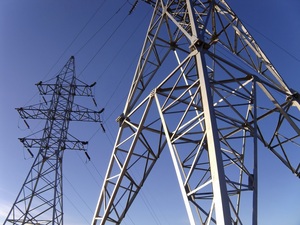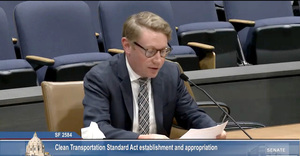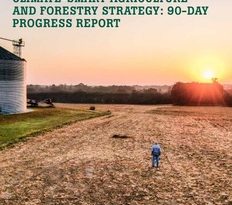Bill aims to create clean transportation standard in Minnesota
Energy Disrupter
ADVERTISEMENT
Legislation currently pending in Minnesota aims to establish a clean transportation standard that would require the state’s transportation fuels to achieve 100 percent reduction in carbon intensity (CI) by 2050.
The standard would phase in with a 25 percent CI reduction requirement by 2030, ramping up to a 75 percent reduction by 2040 and a 100 percent reduction by 2050. A statement released by the Great Plains Institute indicates that, if signed into law, the bill will create the strongest statewide clean transportation standard in the U.S. It would also be the first such standard established in the Midwest.
The legislation tasks the Minnesota Pollution Control Agency with implementing the clean transportation standard. The program would allow fuel producers to apply for and be assigned a fuel pathway and CI score based on their unique production practices. According to the bill, fuel pathways would be determined using the most recent version of Argonne National Laboratory’s GREET model, adapted to Minnesota. The fuel pathway determination process would be consistent for all fuel types, be based on science and engineering, reflect differences in vehicle fuel efficiency and drive trains, and account for any on-site additional energy use by carbon capture technology employed in the fuel production process, including generation, distillation and compression.
The clean transportation standard would be implemented via a credit-based system. Credits would be prohibited from being generated for certain activities, including carbon capture and underground storage of carbon dioxide used for enhanced oil recovery; the production of biofuels from feedstock grown on croplands with fewer than five consecutive years of cropping history; and renewable natural gas (RNG) produced from any new or expanded agricultural livestock production facility.
The program would allow a credit premium of 5 percent for cropland-derived biofuels produced on acreage utilizing soil-healthy farming practices and fertilizer best management practices. A 10 percent credit premium would be allowed for cropland-derived biofuels produced on acreage utilizing continuous living cover cropping systems.
Aviation fuels would be exempt from the clean transportation standard. Aviation fuel producers, however, would be eligible to elect to participate in the program.
The Clean Transportation Standard Act, or SF 2584, was introduced in the Minnesota Senate on March 6. Companion legislation, HF 2602, was introduced in the Minnesota House of Representatives on the same day.
Brian Werner, executive director of the Minnesota Bio-Fuels Association, testified during a March 10 hearing held to address the legislation by the Senate State and Local Government and Veterans Committee. In his testimony, Werner said a low carbon fuel standard in Minnesota offers the potential to lower greenhouse gas (GHG) emissions in the transportation sector and support communities within the state if crafted properly and combined with complementary policies. He said any clean fuel standard implemented in the state should be technology and feedstock neutral; properly account for feedstock production practices and evaluation of CI; increase market access for renewable fuels; and enable regional collaboration. “Reducing carbon emissions from our transportation sector and putting Minnesota on track to meet its climate goals will take an all-of-the-above approach that utilizes immediate, affordable, and abundant tools like low carbon biofuels,” Werner said.
A full copy of the bill is available on the Minnesota Legislature website.
















